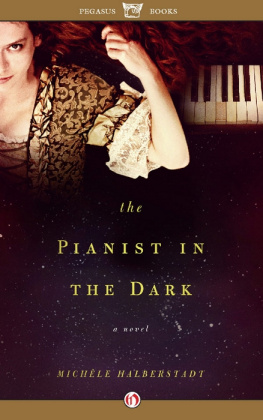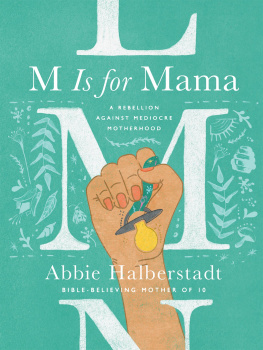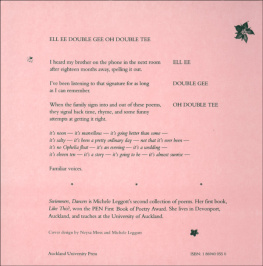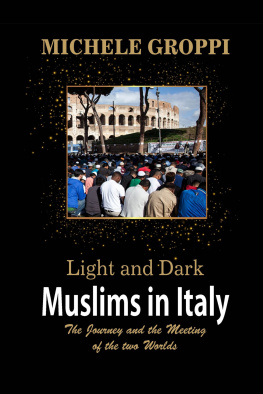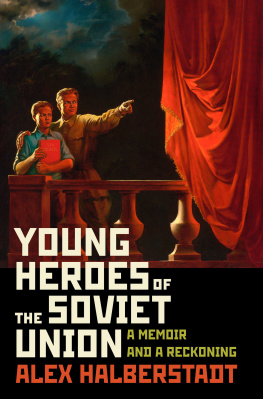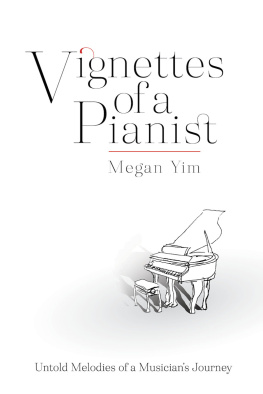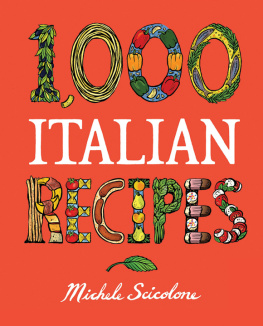Michéle Halberstadt - The Pianist in the Dark
Here you can read online Michéle Halberstadt - The Pianist in the Dark full text of the book (entire story) in english for free. Download pdf and epub, get meaning, cover and reviews about this ebook. year: 2011, publisher: Pegasus Books, genre: Prose. Description of the work, (preface) as well as reviews are available. Best literature library LitArk.com created for fans of good reading and offers a wide selection of genres:
Romance novel
Science fiction
Adventure
Detective
Science
History
Home and family
Prose
Art
Politics
Computer
Non-fiction
Religion
Business
Children
Humor
Choose a favorite category and find really read worthwhile books. Enjoy immersion in the world of imagination, feel the emotions of the characters or learn something new for yourself, make an fascinating discovery.
- Book:The Pianist in the Dark
- Author:
- Publisher:Pegasus Books
- Genre:
- Year:2011
- Rating:5 / 5
- Favourites:Add to favourites
- Your mark:
- 100
- 1
- 2
- 3
- 4
- 5
The Pianist in the Dark: summary, description and annotation
We offer to read an annotation, description, summary or preface (depends on what the author of the book "The Pianist in the Dark" wrote himself). If you haven't found the necessary information about the book — write in the comments, we will try to find it.
The Pianist in the Dark — read online for free the complete book (whole text) full work
Below is the text of the book, divided by pages. System saving the place of the last page read, allows you to conveniently read the book "The Pianist in the Dark" online for free, without having to search again every time where you left off. Put a bookmark, and you can go to the page where you finished reading at any time.
Font size:
Interval:
Bookmark:


PEGASUS BOOKS
NEW YORK
To Laurent Bonelli
my little prince
But the fool on the hill
Feels the sun coming down
And the eyes in his head
See the world spinning round
The Beatles
S HE DOESNT KNOW THE COLOR OF THE SKY OR THE shape of the clouds, doesnt know the meaning of blue or red, of dark or pale. She lives in blackness. This is the word they have given to what she describes. She can make out light by its heat, its smell, sometimes even its sound: the flickering of a candle, the crackling of fire. She knows that daytime throbs with agitation and that silence awaits nightfall to be heard. Luckily for her, listening is what she does best.
She discerns sounds to which no one lends an ear: the greenhouse pane shuddering in its frame when the west wind blows; the cats tongue scraping its coat as it licks itself clean. She has never mistaken a sharp for a flat, a wood pigeon for a turtledove. What stirs her blood are the nuancesthe spectrum of sounds, the scale of emotions. She can differentiate between alarm and fear, between a gust and a breeze, between courtesy and sincerity, between allegro and allegretto. She feels, she quivers. She vibrates, trembles, shivers.
She blushes as well.
She hopes she is pretty but is not reassured by the sympathies she elicits from her visitors. How can they be trusted? They are blinded by the pity she inspires. A young woman sitting before her musical instrument makes for a fetching image. She imagines it, composes it behind her eyelids. It could be the name of a painting. Young Woman at the Piano. But for the painting to work, the woman in question must be attractive.
She remembers when her father overheard her timidly asking Nina, the chambermaid, Would you say Im pretty?how he rushed out from the drawing room, placed his daughters hands around Ninas ample hips, then around her own, and murmured: Youre so delicate, your hands almost fit around your waist. The pride she felt just then rippled through her body like a wave of heat.
So, she is delicate. With a pleasant figure. She has long, thick hair that Nina confines in a silk net to keep it out of her face. It stays hidden behind her neck, the low bun growing heavier as the day wears on. Her cheeks seem soft to the touch, her straight nose a bit long, her mouth full, lips chapped because she nibbles at them then tries in vain to relieve the burning with a flick of the tongue.
She is proud of her slender fingers, the nails, cut short, which she polishes every day before feeling for the flowers engraved around the lock on the piano lid, the key to which never leaves her pocket.
It is her piano, hers and hers alone.
She has locked her world inside it. Seven notes that can segue into infinity for those who take the pains to master them. For her it was not about pain, but suffering. She should hate that instrument, symbol of a world that abruptly turned its back on her. Still, she plays tirelessly, her eyes open like two crystals that no longer reflect a thing, neither curves nor colors. Her gaze has been blank, like a window with its shutters closed, since that wooly morning she woke up blind.
Can anyone remember anything from the age of three? Her first memory is of loss, fear.
She wakes up and does not recognize anything. The world around her is a dark blur. When she reaches out her hand, the candle flame burns it. She lets out a piercing scream, but not of pain. Her terror is absolute. She senses the candle but cannot see it. She knows she should be able to discern its flickering glow, yet nothing emerges from the obscurity that has engulfed her. She turns around, gropes in her bed, finds the piece of bluish satin that she rolls around her thumb to fall asleep. The cloth has lost its shimmer. It is just another ominous element in the blackness that has erased everything from her room. She screams.
People come rushing in. She recognizes them only by their voices, their scents. Her fathers hoarse, quivering pitch; the starch that perfumes Ninas apron and the freshness of her soothing hands; her mothers hysterical wails and warm tears that dampen the piece of satin she sucks on as she rocks to a nursery rhyme only she can hear. Trying to soothe the fear, to tame the darkness that has swallowed her since she woke.
Topsy-turvy. Everyone around her is thrust into an emotional vortex. They try to escape, they flail about, they run in circles. Frenzied footsteps, doors slamming shut, servants scurrying about, windows bursting open, shouts to have the carriage prepared; then hoofs banging on the cobblestone, whips snapping at manes, horses galloping a few streets away to fetch Herr Stolz, the family doctorhis heavy, muffled footsteps in her bedroom, the clanking of cold instruments he removes from his bag, the warm compresses he instructs Nina to hold against her eyelids till they burn, the steam baths, the salves, the ointments. Nothing works. Neither silence nor noise. Neither cold nor heat. Nor prayers, nor tears, nor science, nor medicine. Neither her mothers pleading nor Ninas hands.
Eight days later, the news had made its way around Vienna. Maria Theresia von Paradis, the only child of the Imperial Secretary to the Empress, has lost her sight.
S HE PLAYED THE PIANO BEFORE. OR RATHER, SHE loved to put her fingers on the keys that seemed disproportionately large beneath her tiny hands. Especially the long black ones, higher than the white ones, slimmer, more mysterious as well. Though a black key alone is of little interest, it can transform the sonority of a white one: accentuate its lightness, underscore its melancholy.
The wooden piano in the parlor had always been her refuge, her favorite toy. She considers that she had mastered music before language. As a matter of fact, she sang her first word. She hated it when the cat would sit on the edge of the piano lid. She would tell him to Get down! Runter! she would say. But he scared her a bit, so she softened the imperative, finessing it into two notesD, E. Runter became the nickname of poor Hanz, who at the age of twelve had to get used to this new appellation.
Her days are now invariably spent behind a piano. When she practices or gives a concert, it is on the stately grand piano that proudly dominates the large drawing room. But when she can get away and play for herself, when she wants to improvise, compose, rant and rave, confide in herself, assuage the vehemence she keeps bottled up, it is on the piano that Runter no longer dares approach. She has the only key that opens it, but she knows that it is in fact the piano which holds the key to her dreams, her turmoil. It is a diary full of feelings she refuses to share with anyone, feelings she smothers by keeping them to herself. Only the piano of her childhood knows her secrets.
The yellow of the candle, the blue of the satin, the off-white of the milk that left the yummy mustache on her upper lipthese are the only colors etched in her memory. She knows that the sun looks like the candle, the sky like the cloth, the piano keys like the color of milk. She has forgotten all the others. Red, green, orange, purplethey mean nothing to her. They are words devoid of meaning. So she has turned them into notes. Red is vivid, thus G-sharp. Green is a soft shade: F. Orange is conspicuous: E. Purple is more discreet: C-flat. And to the color of the wood framing her piano she has given her favorite note: C.
Next pageFont size:
Interval:
Bookmark:
Similar books «The Pianist in the Dark»
Look at similar books to The Pianist in the Dark. We have selected literature similar in name and meaning in the hope of providing readers with more options to find new, interesting, not yet read works.
Discussion, reviews of the book The Pianist in the Dark and just readers' own opinions. Leave your comments, write what you think about the work, its meaning or the main characters. Specify what exactly you liked and what you didn't like, and why you think so.

